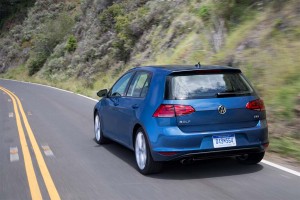Volkswagen was the first automaker to put a dual-clutch gearbox into production and with the technology becoming increasingly commonplace, the German maker hopes to jump back into the lead with the debut of a new 10-speed transmission.
VW unveiled the new 10-speed DSG at a preview of an array of new, high-efficiency powertrain technologies, part of its so-called “Think Blue” program. Its stated goal is to become the world’s most sustainable automaker by 2018.
There are three parts to the Think Blue project, according to VW, “Developing efficient products and technologies, actively involving people to promote environmental awareness and supporting environmentally relevant and initiatives globally.”
Dual-clutch transmissions are designed to merge the best attributes of conventional manual and automatic transmissions. They are, in effect, an electronically shifted manual gearbox. Unlike earlier, single-clutch systems, they can anticipate what gear is going to be used next, resulting in shifts that are both smoother and quicker – while also reducing fuel consumption.
Whether with stick shifts, DSGs or conventional automatics, automakers have been rapidly adding more gears to their transmissions. Keeping an engine operating at the sweet spot of its rev range is another way to improve mileage. Once cutting edge, six- and seven-speed designs are today just the starting point. Eight- and even nine-speed transmissions are becoming increasingly common, the latter showing up in products as diverse as the Jeep Cherokee and new Range Rover.
The question is how many gears are too many. As Chrysler learned during the months leading up to the delayed launch of the Cherokee, tuning a nine-speed can be a nightmare. Ford, meanwhile, has taken numerous hits for problems with its dual-clutch transmission in small models like the Focus and Fiesta.
But with regulators rapidly raising mileage and emissions standards around the world, the race to add still more gears isn’t likely to abate anytime soon. Ford and General Motors are in the midst of an unusual joint venture to develop a 10-speed conventional automatic transmission that should reach market in several years.
(UAW may “win” VW’s Tennessee plant after all. For more, Click Here.)
Volkswagen, for its part, has not said when the new 10-speed DSG will reach market. But it’s not likely to take long. It notes the package is the same size as the current seven-speed dual clutch design, so it could readily be adapted for such models as the VW Golf and Passat that are based off the automaker’s global MQB platform. It apparently also can be adapted to future SUV models so that they wouldn’t need separate low-range gearboxes for off-road use.
(Click Here to see Audi’s new A6 and A7.)
And the design is apparently robust enough to handle up to 405 pound-feet of torque, which would allow the 10-speed to be used in higher-performance models, perhaps on the order of a future Audi S3 or S4.
(To see why GM is laying off 510 hourly workers, Click Here.)
VW showed off some other intriguing, sustainable technologies during what it dubbed an Innovation Workshop, including a variation of Stop/Start that would actually shut off an engine even while the vehicle is coasting. And a new infrared-reflecting instrument panel should reduce heat load in a vehicle, reducing the work of its climate control system.
The maker also showed off a new version of its 2.0-liter twin-turbo diesel that it says will make 268 horsepower. That’s the highest output per liter of any diesel in the world.


Reminds me of this:
http://snltranscripts.jt.org/75/75atriple.phtml
We’ll see 11 speeds, maybe 12, at some point
The question is: at what point does a multi-speed transmission become a CVT?
I pointed out long ago that 7+ speed trans were essentially reliable CVTs that can handle higher torque loads than typical CVTs.
In reality more gears beyond 6-7 for pass cars will help very low power engines get better mpg and possibly slightly improved performance. This is akin to a heavy truck that uses 10+ gears to get moving and then is able to cruise at highway speeds with modest engine rpm.
Unfortunately these 7+ gear trans cost considerably more to produce, often require more packaging room and typically weigh more. While VW may have resolved some packaging/weight issues they can’t likely reduce the cost without compromising reliability.
The sticker price could easily jump $2,000+ for these 7+ gear trans. This is just one more absurd expense that consumers are being forced to pay for the unrealistic, impossible to meet, 54.5 mpg CAFE figure pulled from Obama and the EPA’s orifice. This is another example of bad government exploiting the populace to pay for their outrageous decrees.
I just wish that VW would worry about quality and reliability of their vehicles.
Had several VWs and nothing but problems…Never again will one park in my driveway.